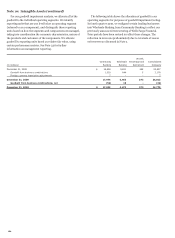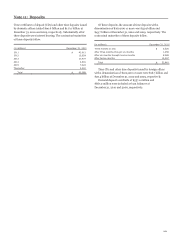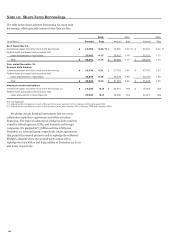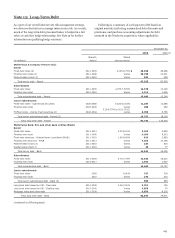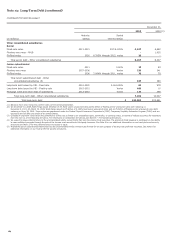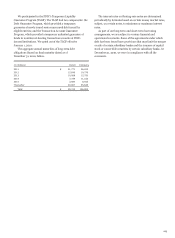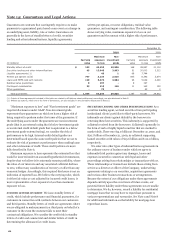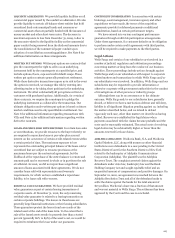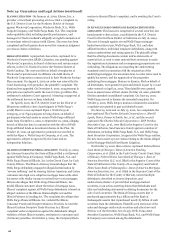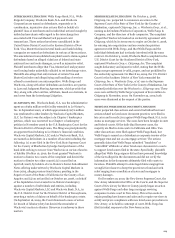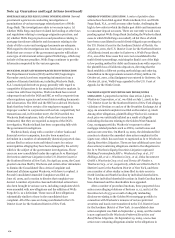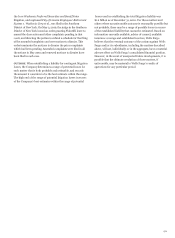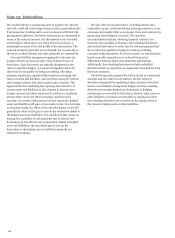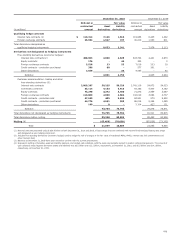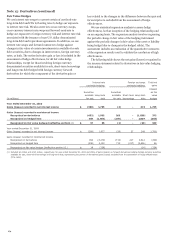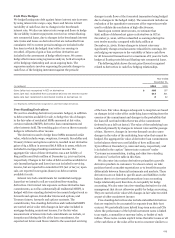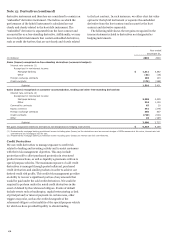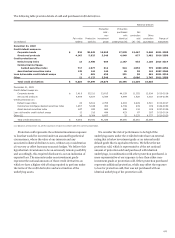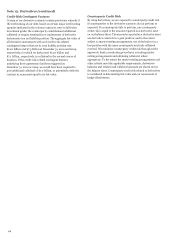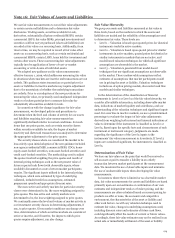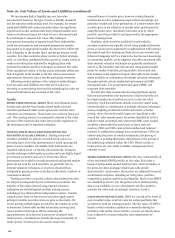Wells Fargo 2010 Annual Report Download - page 172
Download and view the complete annual report
Please find page 172 of the 2010 Wells Fargo annual report below. You can navigate through the pages in the report by either clicking on the pages listed below, or by using the keyword search tool below to find specific information within the annual report.Note 14: Guarantees and Legal Actions (continued)
MORTGAGE RELATED REGULATORY INVESTIGATIONS Several
government agencies are conducting investigations or
examinations of various mortgage related practices of Wells
Fargo Bank. The investigations relate to two main topics, (1)
whether Wells Fargo may have violated fair lending or other laws
and regulations relating to mortgage origination practices; and
(2) whether Wells Fargo’s practices and procedures relating to
mortgage foreclosure affidavits and documents relating to the
chain of title to notes and mortgage documents are adequate.
With regard to the investigations into foreclosure practices, it is
likely that one or more of the government agencies will initiate
some type of enforcement action against Wells Fargo, which may
include civil money penalties. Wells Fargo continues to provide
information requested by the various agencies.
MUNICIPAL DERIVATIVES BID PRACTICES INVESTIGATION
The Department of Justice (DOJ) and the SEC, beginning in
November 2006, have been requesting information from a
number of financial institutions, including Wachovia Bank,
N.A.’s municipal derivatives group, generally with regard to
competitive bid practices in the municipal derivative markets. In
connection with these inquiries, Wachovia Bank has received
subpoenas from both the DOJ and SEC as well as requests from
other regulatory agencies and several states seeking documents
and information. The DOJ and the SEC have advised Wachovia
Bank that they believe certain of its employees engaged in
improper conduct in conjunction with certain competitively bid
transactions and, in November 2007, the DOJ notified two
Wachovia Bank employees, both of whom have since been
terminated, that they are regarded as targets of the DOJ’s
investigation. Wachovia Bank has been cooperating fully with
the government investigations.
Wachovia Bank, along with a number of other banks and
financial services companies, has also been named as a
defendant in a number of substantially identical purported class
actions filed in various state and federal courts by various
municipalities alleging they have been damaged by the activity
which is the subject of the government investigations. These
cases are now consolidated under the caption In re Municipal
Derivatives Antitrust Litigation in the U.S. District Court for
the Southern District of New York. On April 30, 2009, the Court
granted a motion filed by Wachovia and certain other defendants
to dismiss the Consolidated Class Action Complaint and
dismissed all claims against Wachovia, with leave to replead. A
Second Consolidated Amended Complaint was filed on
June 18, 2009, and a motion to dismiss that complaint was
denied. A number of putative class and individual actions have
also been brought in various courts, including complaints which
were amended with new allegations and the addition of Wells
Fargo & Co. as a defendant. These cases all have allegations
substantially similar to those in the consolidated class
complaint. All of the cases are being coordinated in the U.S.
District Court for the Southern District of New York.
ORDER OF POSTING LITIGATION A series of putative class
actions have been filed against Wachovia Bank, N.A. and Wells
Fargo Bank, N.A., as well as many other banks, challenging the
high to low order in which the Banks post debit card transactions
to consumer deposit accounts. There are currently 12 such cases
pending against Wells Fargo Bank (including the Wachovia Bank
cases to which Wells Fargo succeeded), all but three of which
have been consolidated in multi-district litigation proceedings in
the U.S. District Court for the Southern District of Florida. On
August 10, 2010, the U.S. District Court for the Northern District
of California issued an order in Gutierrez v. Wells Fargo Bank,
N.A., one of the three cases that were not consolidated in the
multi-district proceedings, enjoining the Bank’s use of the high
to low posting method for debit card transactions with respect to
the plaintiff class of California depositors, directing that the
Bank establish a different posting methodology and ordering
remediation in the approximate amount of $203 million. On
October 26, 2010, a final judgment was entered in Gutierrez. On
October 28, 2010, Wells Fargo appealed to the U.S. Court of
Appeals for the Ninth Circuit.
WACHOVIA EQUITY SECURITIES AND BONDS/NOTES
LITIGATION A purported securities class action, Lipetz v.
Wachovia Corporation, et al., was filed on July 7, 2008, in the
U.S. District Court for the Southern District of New York alleging
violations of Sections 10 and 20 of the Securities Exchange Act of
1934. An amended complaint was filed on December 15, 2008.
Among other allegations, plaintiffs allege Wachovia’s common
stock price was artificially inflated as a result of allegedly
misleading disclosures relating to the Golden West Financial
Corp. mortgage portfolio, Wachovia’s exposure to other
mortgage related products such as CDOs, control issues and
auction rate securities. On March 19, 2009, the defendants filed
a motion to dismiss the amended class action complaint in the
Lipetz case, which has now been re-captioned as In re Wachovia
Equity Securities Litigation. There are four additional cases (not
class actions) containing allegations similar to the allegations in
the In re Wachovia Equity Securities Litigation captioned
Stichting Pensioenfonds ABP v. Wachovia Corp. et al., FC
Holdings AB, et al. v. Wachovia Corp., et al., Deka Investment
GmbH v. Wachovia Corp. et al. and Forsta AP-Fonden v.
Wachovia Corp., et al., respectively, which were filed in the U.S.
District Court for the Southern District of New York, and there
are a number of other similar actions filed in state courts in
North Carolina and South Carolina by individual shareholders.
Two of the individual shareholder actions in South Carolina have
been dismissed and the shareholders have appealed.
After a number of procedural motions, three purported class
action cases alleging violations of Sections 11, 12, and 15 of the
Securities Act of 1933 as a result of allegedly misleading
disclosures relating to the Golden West mortgage portfolio in
connection with Wachovia’s issuance of various preferred
securities and bonds were transferred to the U.S. District Court
for the Southern District of New York. A consolidated class
action complaint was filed on September 4, 2009, and the matter
is now captioned In Re Wachovia Preferred Securities and
Bond/Notes Litigation. On September 29, 2009, a non-class
action case containing allegations similar to the allegations in
170


